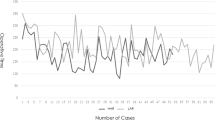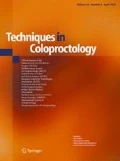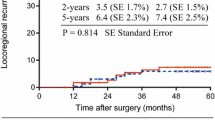Abstract
Background
Several minimally invasive techniques have now been described for rectal cancer resection. Current outcome data for these approaches from high volume, single institutions remain limited. Our aim was to review outcomes in patients undergoing minimally invasive surgery for rectal cancer at our institution in the current era.
Methods
A retrospective analysis was done to assess short-term benefits and oncologic outcomes in patients undergoing minimally invasive surgery for rectal cancer between 2004 and 2007.
Results
One-hundred consecutive patients (61 men, median age 62) with a median follow-up of 1.8 years were identified. Sixty-seven had hand-assisted laparoscopic surgery (HALS), while 33 were done laparoscopic-assisted (LA). Seventy-two patients underwent anterior resection, 27 an abdominal perineal resection, and 1 a total proctocolectomy. Tumor stage was stage 1 (21%), stage 2 (17%), stage 3 (56%), and stage 4 (6%). A median of 16 lymph nodes, a median 3.4 cm distal margin, and a 99% negative circumferential margin was achieved. The 3-year disease-free and overall survivals were 86.2 and 94.5%, respectively. Three cases required conversion. Median time to both diet and first bowel movement was 3 days, and median length of stay was 5 days. Length of stay, time to soft diet, incision length, and pain scores were less using a LA approach compared to HALS (P < 0.01). Overall morbidity was 26% with no mortality.
Conclusion
Both minimally invasive techniques used achieved excellent oncologic results in patients with rectal cancer. The LA approach had slightly better short-term outcomes.



Similar content being viewed by others

References
Noel JK, Fahrbach K, Estok R et al (2007) Minimally invasive colorectal resection outcomes: short-term comparison with open procedures. J Am Coll Surg 204:291–307
Veldkamp R, Kuhry E, Hop WC et al (2005) Laparoscopic surgery versus open surgery for colon cancer: short-term outcomes of a randomised trial. Lancet 6:477–484
Guillou PJ, Quirke P, Thorpe H et al (2005) Short-term endpoints of conventional versus laparoscopic-assisted surgery in patients with colorectal cancer (MRC CLASICC trial): multicentre, randomised controlled trial. Lancet 365:1718–1726
The Clinical Outcomes of Surgical Therapy Study Group (2004) A comparison of laparoscopically assisted and open colectomy for colon cancer. N Engl J Med 350:2050–2059
Fleshman J, Sargent DJ, Green E et al (2007) Laparoscopic colectomy for cancer is not inferior to open surgery based on 5-year data from the COST study group trial. Ann Surg 246:655–664
Jayne DG, Guillou PJ, Thorpe H et al (2007) Randomized trial of laparoscopic-assisted resection of colorectal carcinoma: 3-year results of the UK MRC CLASICC trial group. J Clin Oncol 25:3061–3068
Abraham NS, Byrne CM, Young JM et al (2007) Meta-analysis of non-randomized comparative studies of the short-term outcomes of laparoscopic resection for colorectal cancer. ANZ J Surg 77:508–516
Aziz O, Constantinides V, Tekkis PP et al (2006) Laparoscopic versus open surgery for rectal cancer: a meta-analysis. Ann Surg Oncol 13:413–424
Braga M, Vignali A, Zuliani W et al (2005) Laparoscopic versus open colorectal surgery: cost-benefit analysis in a single-center randomized trial. Ann Surg 242:890–895
Fleshman JW, Wexner SD, Anvari M et al (1999) Laparoscopic versus open abdominoperineal resection for cancer. Dis Colon Rectum 42:930–939
Morino M, Allaix ME, Giraudo G et al (2005) Laparoscopic versus open surgery for extraperitoneal rectal cancer: a prospective comparative study. Surg Endosc 19:1460–1467
Zaheer S, Pemberton JH, Farouk R et al (1998) Surgical treatment of adenocarcinoma of the rectum. Ann Surg 227:800–811
Zhou ZG, Hu M, Li Y et al (2004) Laparoscopic versus open total mesorectal excision with anal sphincter preservation for low rectal cancer. Surg Endosc 18:1211–1215
Braga M, Frasson M, Vignali A et al (2007) Laparoscopic resection in rectal cancer patients: outcome and cost-benefit analysis. Dis Colon Rectum 50:464–471
Veenhof AA, Engel AF, Craanen ME et al (2007) Laparoscopic versus open total mesorectal excision: A comparative study on short-term outcomes. A single-institution experience regarding anterior resections and abdominoperineal resections. Dig Surg 24:367–374
Palanivelu C, Sendhilkumar K, Jani K et al (2007) Laparoscopic anterior resection and total mesorectal excision for rectal cancer: a prospective nonrandomized study. Int J Colorectal Dis 22:367–372
Laurent C, Leblanc F, Gineste C et al (2007) Laparoscopic approach in surgical treatment of rectal cancer. Br J Surg 94:1555–1561
Bianchi PP, Rosati R, Bona S et al (2007) Laparoscopic surgery in rectal cancer: a prospective analysis of patient survival and outcomes. Dis Colon Rectum 50:2047–2053
Kim SH, Park IJ, Joh YG et al (2006) Laparoscopic resection for rectal cancer: a prospective analysis of thirty-month follow-up outcomes in 312 patients. Surg Endosc 20:1197–1202
Breukink S, Pierie J, Wiggers T (2006) Laparoscopic versus open total mesorectal excision for rectal cancer. Cochrane Database Syst Rev 4:CD005200
Baik SH, Kwon HY, Kim JS et al (2009) Robotic versus laparoscopic low anterior resection of rectal cancer: short-term outcome of a prospective comparative study. Ann Surg Oncol 16:1451–1453
Leroy J, Jamali F, Forbes L et al (2004) Laparoscopic total mesorectal excision (TME) for rectal cancer surgery: long-term outcomes. Surg Endosc 18:281–289
Laurent C, Leblanc F, Wutrich P et al (2009) Laparoscopic versus open surgery for rectal cancer: long-term oncologic results. Ann Surg 250:54–61
Kuhry E, Schwenk W, Gaupset R et al (2008) Long-term results of laparoscopic colorectal cancer resection. Cochrane Database Syst Rev 2:CD003432
Sargent DJ, Wieand HS, Haller DG et al (2005) Disease-free survival versus overall survival as a primary end point for adjuvant colon cancer studies: individual patient data from 20, 898 patients on 18 randomized trials. J Clin Oncol 23:8664–8670
Author information
Authors and Affiliations
Corresponding author
Rights and permissions
About this article
Cite this article
Larson, D.W., Boostrom, S.Y., Cima, R.R. et al. Laparoscopic surgery for rectal cancer: short-term benefits and oncologic outcomes using more than one technique. Tech Coloproctol 14, 125–131 (2010). https://doi.org/10.1007/s10151-010-0577-0
Received:
Accepted:
Published:
Issue Date:
DOI: https://doi.org/10.1007/s10151-010-0577-0



